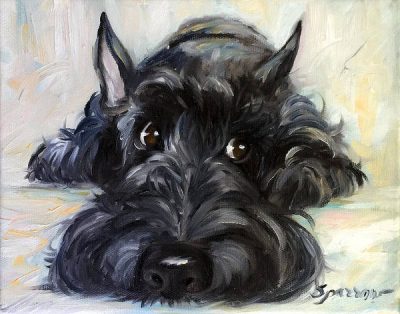
The first poem we ever learned by heart was “Trees” by Joyce Kilmer. It was easy enough for a fourth grader to remember:
We’d still be in fourth grade if we had to memorize the poem below by Walter S. Glynn. See if you can tell the breed of which he writes:
“Lash! Bogie man, haud off your han
Nor thrash me black and blue.
Frae fools and foes I seek nae praise,
But frien ‘s should aye be true.
“Nae si/ky-haired admirer I
0’ Bradford Toys, Strathbogie;
Sich thoughts, I ’m sure cam ‘ in your head,
While dribblin ’ o ’er the cogie.
“I ken the Terrier o’ the North,
I ken the towsy lyke –
Ye ken search frae Tweed to Sussex’ shore,
But never fnd his like.
“For pluck and pith and jaws and teeth,
And hair like heather cowes,
Wi’ body lang and low and Strang.
At hame in cairns or knowes.
“He ’ll face a foumart, draw a brock,
Kill rats and whitteritts by the score,
He ‘ll bang tod-lowrie frae his hole,
Or slay him at his door.
“He ‘ll range for days and ne ’er be tired,
0‘er mountain, moor, and fell;
Fair play, I’ll back the brave wee chap
To fecht the de ’il himsel ’.
“And yet beneath his rugged coal
A heartbeats warm and true.
He‘ll help to herd the sheep and Lye,
And mind the lammies too.
“Then see him at the mgle side,
W1’ ‘ bairnies roond him laughin ’.
Was ever dog sae pleased as he,
Saeforzd 0 ‘fun and daffin ‘?
“But gie ‘s your hand, Strathbogie man!
Guidfaith/ we maurma sever.
Then ‘Here ’s to Scatia ‘s best 0 ’ dogs,
Our towsy tykejbr ever.” ”
“Then see him at the ingle side,
W1’ bairnies roond him laughin’.
Was ever dog sae pleased as he,
Sae fond 0‘fun and daffin’?
“But gie‘s your hand, Strathbogie man!
Guid faith! we maunna sever.
Then ‘Here’s to Scatia’s best 0’ dogs,
Our towsy tyke for ever.’”
The poem named The Scottish Terrier appeared in several places, including Robert Leighton’s The New Book of the Dog published in 1911. We don’t pretend to understand some of the old Scottish terms, but there are phrases we can comprehend, and our favorite verse is this one:
“And yet beneath his rugged coal
A heartbeats warm and true.
He‘ll help to herd the sheep and Lye,
And mind the lammies too.”
It underscores the heart and soul of a Scottie. Still, we’d love to know what the rest of the poem is saying, and if any of our readers understand Scottish Gaelic as written in the poem, please help!
Image: “Mischief” by Mary Sparrow
www.marysparrowsmith.net
www.etsy.com/shop/HangingtheMoonShelby

It’s not Gaelic, it’s old Scots. Take this verse;
He ’ll face a foumart, draw a brock,
Kill rats and whitteritts by the score,
He ‘ll bang tod-lowrie frae his hole,
Or slay him at his door.
That would be;
He’ll face a ferret, draw a badger,
Kill rats and weasels by the score,
He’ll bang a fox (male/tod) from his hole,
Or slay him at his door.
Here’s a link to the Scots dictionary https://dsl.ac.uk/
Brock = badger, Tod =fox
Fair Play, I’ll back the wee dear chap to fetch the devil himself
Then see him at the ingle side (sea side)
With bairnies (babies, young children) roond (round) him laughin
Probably not telling you anything you didn’t already figure out!